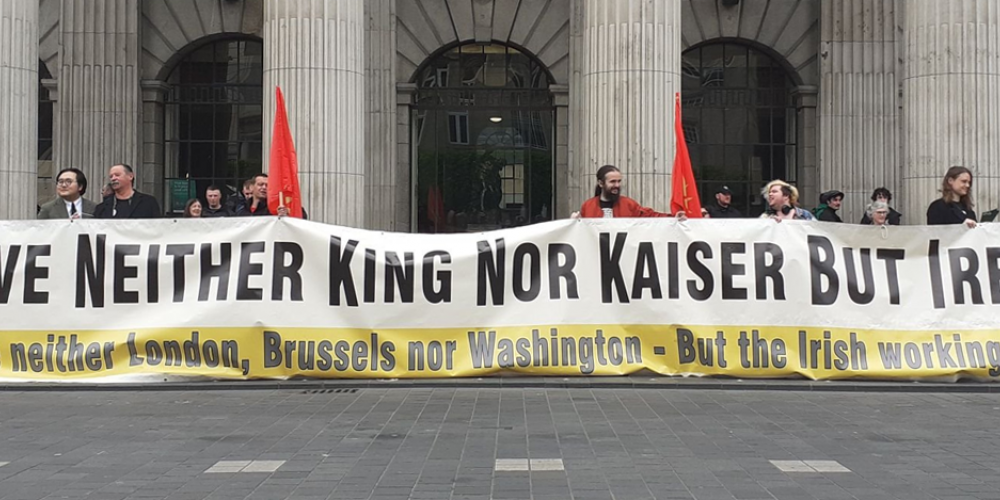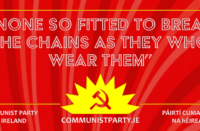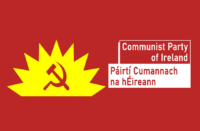The debate over Irish neutrality forces us to confront a deeper question: Is Ireland truly sovereign? Sovereignty is defined as “the complete independence of a state in deciding all questions relating to its internal life and foreign relations. Sovereignty serves…as a rampart under the protection of which individual peoples are able to build their state, develop their economy and culture, and enter into equal and voluntary relations with other peoples.”1
Yet, Ireland’s sovereignty has always been compromised. The six-county statelet remains a British colony, while the 26-county state, despite its claims to independence, has never fully escaped the grip of imperialism.
From its inception, the Irish state lacked true economic sovereignty. Even during the protectionist era, the Department of Finance insisted that policy must “travel in line with British thinking”.2 The Irish industrial bourgeoisie, though initially benefiting from protectionism, failed to build a self-sufficient economy. Rather than empowering the state to drive development, they capitulated to foreign capital. Meanwhile, the agrarian bourgeoisie, large farmers and cattle exporters, wanted tariff-free access to British and European markets.
By the late 1950s, the Irish ruling class had abandoned any pretense of sovereignty. The repeal of the Control of Manufactures Act (1964), the Anglo-Irish Free Trade Agreement (1965), and entry into the EEC (1973) locked Ireland into dependency on British, American, and EU imperialism.
Some Marxists dismiss the fight for sovereignty as a bourgeois concern, arguing that workers should focus solely on socialism. Communist theorist Greg Godels contrasts the struggle for sovereignty, which he sees as defending one’s national bourgeoisie, with the struggle for socialism.3 But this is a false dichotomy. James Connolly understood that national liberation and socialist revolution were inseparable, hence his leading role in the 1916 Rising. Lenin, defending Connolly from critics who accused him of bourgeois nationalism, wrote:
“To imagine that social revolution is conceivable without revolts by small nations in the colonies and in Europe, without revolutionary outbursts by a section of the petty bourgeoisie with all its prejudices, without a movement of the politically non-conscious proletarian and semi-proletarian masses…against national oppression, etc. – to imagine all this is to repudiate social revolution.”4
The struggle for Irish sovereignty is not a defense of the native bourgeoisie, it is a struggle against them. Since, 1922 the Irish ruling class has entrenched its power, aligning itself with imperialist interests. Their position within the NATO/EU imperialist bloc is complex. On the one hand they have billions of euro invested abroad, meaning that a section derives profits from the extraction of surplus value from outside the state. They also allow the state to be used as a clearing house for multinational tax evasion and avoidance, from which they benefit. This is not new phenomenon, when all of Ireland was a direct British colony, sections of the “nationalist” bourgeoisie enjoyed the benefits of British imperialist exploitation of other peoples. From “surrender and regrant” during the Tudor conquest to the present day, the leaders of the Irish people have always put their own material interests first.
The 2008 financial crisis exposed Ireland’s subservience, the EU forced the state to absorb 42% of European banking debt. Meanwhile, the US military uses Shannon Airport as a de facto base, integrating Ireland into its endless wars, without democratic consent. These betrayals reveal a fundamental truth: the Irish bourgeoisie cannot and will not defend national sovereignty.
The fight for sovereignty resonates with Ireland’s anti-colonial tradition, offering the left a platform to challenge both imperialism and the domestic ruling class. It gives us an opportunity to raise issues such the nature of the bourgeois state and the necessity for socialism. A subject nation cannot build socialism. Only when the working class holds state power can Ireland be truly free.
As Connolly declared over a century ago: “The cause of Ireland is the cause of Labour.”
The struggle for sovereignty is not a distraction from socialism, it is an essential part of it.






